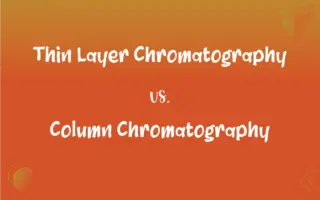Adrenaline vs. Epinephrine: What's the Difference?
Edited by Harlon Moss || By Janet White || Published on January 26, 2024
Adrenaline and epinephrine are the same hormone and neurotransmitter, referred to as adrenaline in the UK and epinephrine in the US.

Key Differences
Adrenaline, commonly known in British English, is a hormone released by the adrenal glands. Epinephrine, its American English equivalent, plays the same role in the body's fight-or-flight response.
In medical terminology, epinephrine is the preferred term, especially in pharmacology in the United States. Adrenaline is used in a similar context in British medical literature.
Adrenaline is also a neurotransmitter that influences various bodily functions. Epinephrine, identically, affects heart rate, muscle strength, blood pressure, and sugar metabolism.
The term adrenaline is often used colloquially to describe excitement or a rush of energy. Epinephrine, although the same substance, is less commonly used in this colloquial manner.
In emergency medicine, adrenaline is administered for conditions like anaphylaxis. Epinephrine, under the same medical conditions, is administered similarly for rapid response.
ADVERTISEMENT
Comparison Chart
Common Name in
UK
US
Medical Term Usage
Used in British medical literature
Preferred in American pharmacology
Function in Body
Hormone for fight-or-flight response
Identical function as adrenaline
Colloquial Usage
Often refers to excitement or energy
Less commonly used colloquially
Use in Medicine
Administered in emergencies like anaphylaxis
Same as adrenaline, with identical application
ADVERTISEMENT
Adrenaline and Epinephrine Definitions
Adrenaline
Adrenaline is a hormone released by the adrenal glands in response to stress.
Skydiving gave him an intense adrenaline rush.
Epinephrine
Epinephrine is a hormone and neurotransmitter involved in the fight-or-flight response.
Epinephrine levels spike during periods of acute stress.
Adrenaline
Adrenaline is synonymous with a feeling of heightened excitement.
The suspense movie triggered a rush of adrenaline in the audience.
Epinephrine
Epinephrine is critical in emergency medicine.
Epinephrine was administered immediately to treat the severe allergic reaction.
Adrenaline
Adrenaline is used in medicine to treat severe allergic reactions.
The doctor administered adrenaline to counter the allergic reaction.
Epinephrine
Epinephrine is used medicinally to treat severe allergic reactions.
An epinephrine auto-injector can be lifesaving during anaphylaxis.
Adrenaline
Adrenaline affects blood flow and muscle strength.
Adrenaline helped him lift the heavy object during the emergency.
Epinephrine
Epinephrine increases cardiac output and raises glucose levels.
The paramedics used epinephrine to stabilize the patient's heart rate.
Adrenaline
Adrenaline increases heart rate and energy levels.
The athlete felt a surge of adrenaline at the start of the race.
Epinephrine
Epinephrine is produced by the adrenal medulla.
The body's natural response to danger includes the release of epinephrine.
Adrenaline
See epinephrine.
Epinephrine
A hormone secreted by the adrenal medulla that is released into the bloodstream in response to physical or mental stress, as from fear or injury. It initiates many bodily responses, including the stimulation of heart action and an increase in blood pressure, metabolic rate, and blood glucose concentration. Also called adrenaline.
Adrenaline
(hormone) epinephrine, the hormone and neurotransmitter.
Epinephrine
A white to brownish crystalline compound, C9H13NO3, isolated from the adrenal glands of certain mammals or synthesized and used in medicine as a heart stimulant, vasoconstrictor, and bronchial relaxant.
Adrenaline
Excitement; thrills.
Epinephrine
(medicine) A catecholamine hormone and neurotransmitter; as a hormone, secreted by the adrenal gland in response to stress (when it stimulates the autonomic nervous system); as a neurotransmitter, synthesized from norepinephrine. It is also used as a medication.
Adrenaline
.
Epinephrine
A catecholamine secreted by the adrenal medulla in response to stress (trade name Adrenalin); stimulates autonomic nerve action
Adrenaline
A hormone secreted by the adrenal medulla that acts as a powerful stimulant in reponse to fear or stress; it stimulates autonomic nerve action. It can be obtained as a crystalline substance, C9H13NO3. It is used in medicine as a vasoconstrictor (hemostatic) and cardiac stimulant, also to reduce allergic reactions and to stimulate the heart in cases of cardiac arrest.
Adrenaline
A catecholamine secreted by the adrenal medulla in response to stress (trade name Adrenalin); stimulates autonomic nerve action
FAQs
Can adrenaline improve athletic performance?
Yes, temporarily by increasing strength and alertness.
What triggers the release of adrenaline?
Stress, fear, or excitement can trigger adrenaline release.
How quickly does epinephrine act in emergencies?
It acts rapidly, often within minutes.
Can epinephrine be taken orally?
No, it's ineffective orally and is usually injected.
Does adrenaline have a role in mental health?
Yes, chronic adrenaline release can contribute to stress-related disorders.
Are there side effects to epinephrine injections?
Possible side effects include palpitations, sweating, and nervousness.
Is epinephrine only used for allergic reactions?
No, it's also used in cardiac arrest and asthma attacks.
Does adrenaline affect blood pressure?
Yes, it typically raises blood pressure.
How does adrenaline impact sugar metabolism?
It stimulates glucose release, increasing blood sugar levels.
Can epinephrine expire?
Yes, it has an expiration date and should be replaced regularly.
Can adrenaline cause anxiety?
Excessive adrenaline release can contribute to anxiety symptoms.
What are common forms of epinephrine for medical use?
Auto-injectors and injectable solutions are common.
What's the difference in the structure of adrenaline and epinephrine?
Structurally, they are identical; the difference is in the name.
Is adrenaline used in CPR?
Yes, it's often used in advanced cardiac life support.
Can adrenaline affect memory?
Yes, it can enhance memory formation during high-emotion events.
How does epinephrine affect asthma?
It relaxes airway muscles, easing breathing in asthma attacks.
Is epinephrine safe for children?
Yes, in appropriate doses for medical emergencies.
Are adrenaline and epinephrine addictive?
No, but the sensation they induce can be sought after.
How is epinephrine stored in the body?
It's produced and stored in the adrenal glands.
Does adrenaline influence muscle strength?
Temporarily, it can enhance muscle strength and performance.
About Author
Written by
Janet WhiteJanet White has been an esteemed writer and blogger for Difference Wiki. Holding a Master's degree in Science and Medical Journalism from the prestigious Boston University, she has consistently demonstrated her expertise and passion for her field. When she's not immersed in her work, Janet relishes her time exercising, delving into a good book, and cherishing moments with friends and family.
Edited by
Harlon MossHarlon is a seasoned quality moderator and accomplished content writer for Difference Wiki. An alumnus of the prestigious University of California, he earned his degree in Computer Science. Leveraging his academic background, Harlon brings a meticulous and informed perspective to his work, ensuring content accuracy and excellence.




































































